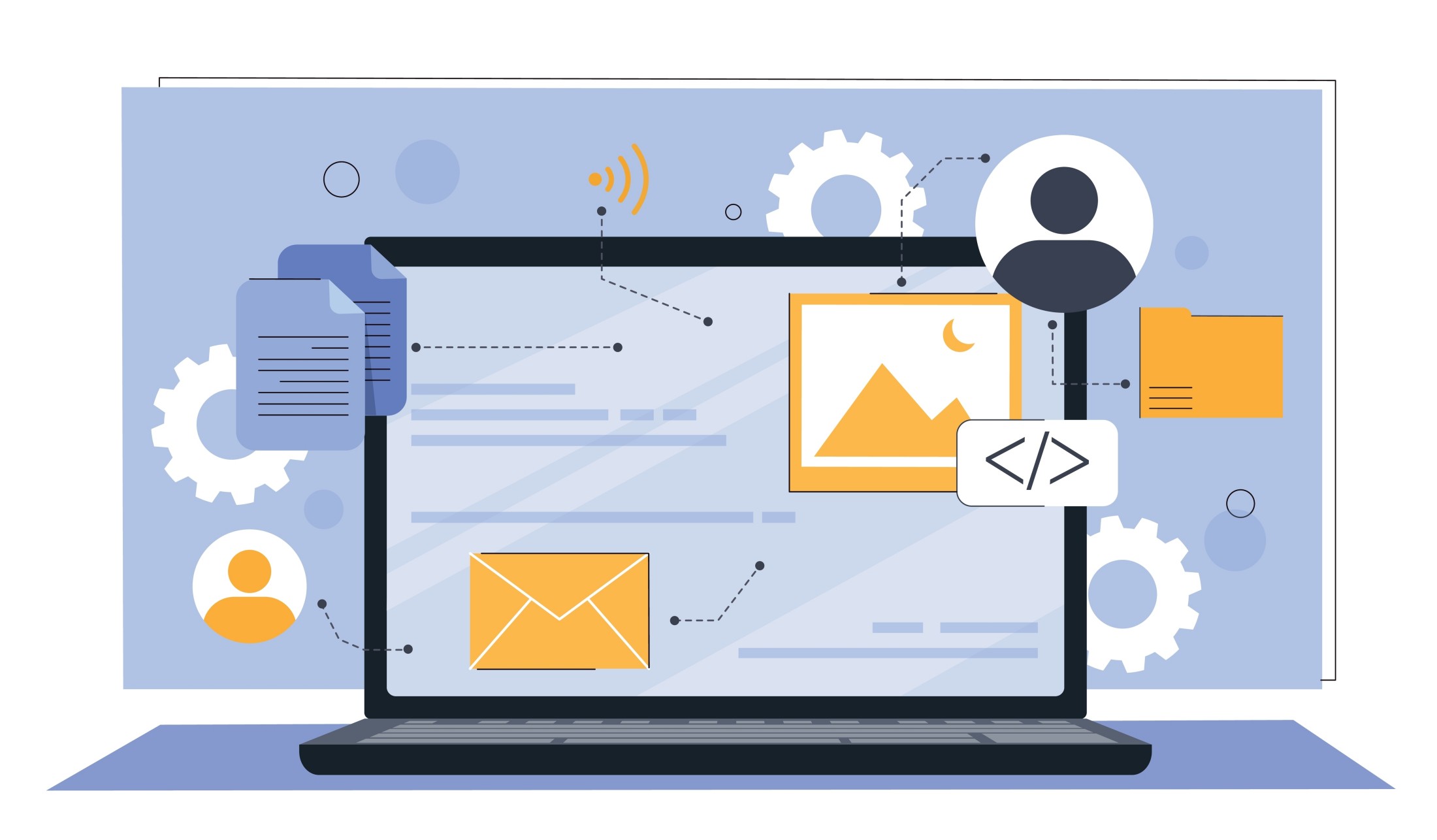Carving out a robust online presence is not just an option but a critical necessity for businesses striving for success. Whether you're a burgeoning startup or an established enterprise, a compelling digital footprint acts as your first touchpoint with potential customers, partners, and stakeholders. This is where a Content Management System (CMS) comes into play.
A CMS not only equips you with the tools to create, manage, and modify content on your website, but it also allows you to shape a dynamic and engaging digital experience for your users.
What Is a Content Management System?
A Content Management System (CMS) is a robust software suite, or a series of interconnected applications, designed to enable users to effortlessly create, manage, and modify digital content. Serving as the backbone of many modern websites, CMS platforms come equipped with intuitive user interfaces that make it straightforward for even those without technical know-how to efficiently handle content modification tasks.
The functionality of a CMS extends beyond simple content management, offering a range of benefits that can drastically improve the efficiency and online impact of businesses of all scales:
- Efficiency Enhancement
The primary goal of a CMS is to streamline the management and updating of web content. By centralizing the content into a single platform, it eliminates the need for extensive coding and technical expertise, saving businesses valuable time and resources. - Promotion of Collaboration
A CMS fosters an environment conducive to teamwork. These platforms are designed to allow multiple users to contribute and edit content concurrently, facilitating seamless collaboration among team members, regardless of geographical location. - SEO-Optimization
SEO is a critical aspect of online visibility. Most CMS platforms come pre-equipped with an array of SEO tools that make it simpler for businesses to optimize their content and website structure to rank higher on search engine results, thereby increasing their organic reach. - Customization Possibilities
One size doesn't fit all. Recognizing this, CMS platforms provide a wide array of plugins and themes, allowing businesses to tailor their website's functionality and aesthetics according to their unique brand ethos and customer needs. - Scalability
Businesses evolve over time, and so do their digital needs. A CMS can accommodate such growth, providing scalable solutions that can adapt to handle increasing content volumes and web traffic.
With these comprehensive insights into what a CMS is and how it can benefit your business, let's pivot towards examining the top CMS platforms that are leading the market in 2023:
Joomla
Joomla, one of the most robust open-source CMS platforms, has stepped up its game with the release of Joomla 4. This version has taken a giant leap forward, bringing substantial enhancements in SEO capabilities and accessibility.
Key Features
- Fine-Tuned SEO
Joomla 4 has placed a greater emphasis on SEO, equipping its users with powerful built-in tools to optimize website content more effectively. These tools allow for comprehensive metadata and keyword input, URL rewriting, and the creation of SEO-friendly URLs, aiding your website's visibility in search engine rankings. - Augmented Accessibility
Joomla 4 has been built with inclusivity in mind. It ensures all users, regardless of their abilities, can access, understand, navigate, and interact with the website. Joomla 4 conforms to WCAG 2.0 (Web Content Accessibility Guidelines), ensuring those with visual, cognitive, or mobility impairments can use the platform with ease.
Pros
- Strength and Flexibility
Joomla is renowned for its robustness and flexibility. It can support and efficiently manage complex websites with diverse content types. Whether you're running an e-commerce store, a social networking site, or a multilingual enterprise-level site, Joomla 4 can handle it all. - Broad Community Support
With a massive global community of developers and users, Joomla provides extensive resources, including forums, tutorials, and extensions, making troubleshooting more manageable.
Cons
- Steep Learning Curve
For those new to CMS or without technical background, Joomla can initially seem challenging due to its intricate functionality and setup. - Limited Themes and Extensions
Although there is a relatively limited selection of themes and extensions compared to some of its competitors, this doesn't restrict its adaptability or versatility. In fact, Joomla is renowned for its flexibility, allowing businesses of all types to create custom modules and extensions that suit their unique needs. By doing so, you can tailor your website's functionality in alignment with your specific business operations.
Best Match For
Joomla 4 is an excellent fit for businesses that require managing extensive, multilingual websites. It's particularly well-suited to those with unique requirements not met by more streamlined CMS platforms. It provides the flexibility needed to handle various content types and complex site structures effectively.
WordPress
As a frontrunner in the CMS landscape, WordPress continues to dominate as a go-to choice for many, owing to its user-friendly design and an immense repository of themes and plugins.
Key Features
- User Experience
WordPress prioritizes user experience above all. Its interface is intuitive, straightforward, and accessible, making it an excellent choice even for those with limited technical expertise. The learning curve is notably smooth, making it an ideal choice for those entering the world of website creation. - Expansive Library
WordPress boasts an unrivaled collection of free and premium themes and plugins. This vast library allows you to experiment with different aesthetics and functionalities, enabling you to create a unique, tailor-made digital presence for your brand.
Pros
- Versatility
One of the key strengths of WordPress lies in its adaptability. Its architecture is designed to support an array of website types, ranging from personal blogs to expansive e-commerce platforms, making it a versatile choice irrespective of your project's scope and complexity. - Robust Community
WordPress is backed by a global community of developers and users. This network provides extensive support in the form of tutorials, forums, and troubleshooting resources, ensuring you're never alone in your website creation journey.
Cons
- Security Concerns
Its popularity has a flipside; WordPress often finds itself a target for malicious attacks. While WordPress itself is secure, vulnerabilities can appear through outdated plugins and themes, necessitating regular updates and reliable security measures. - Performance
While plugins enhance the functionality of a WordPress site, they can occasionally lead to performance issues. Some plugins might slow down your website, negatively affecting the user experience and potentially your SEO rankings.
Best Match For
WordPress is a versatile CMS, making it an ideal match for a variety of users. It suits small to medium businesses looking to establish a dynamic online presence, bloggers keen on sharing their thoughts with the world, and beginners stepping into website creation. WordPress's ease of use, coupled with its flexibility, makes it a practical choice for many digital endeavors.
Drupal
Drupal stands as a formidable, open-source CMS platform renowned for its powerful capabilities and stringent security measures. Catering to websites that require robust functionality and high-security levels, Drupal has carved a niche for itself in the CMS landscape.
Key Features
- Top-Notch Security
Drupal puts a high premium on security, providing enterprise-level measures that have earned it a spot in the digital strategies of various high-profile organizations and government entities worldwide. It offers in-depth security reports and regular updates to maintain a secure environment. - Customizability
Drupal is built to accommodate your unique needs. It provides an impressive degree of control over user roles and permissions, content types, views, and other website elements, enabling businesses to customize their websites according to their specific requirements.
Pros
- Scalability
Drupal excels in managing high-traffic websites and large volumes of data. It's engineered to perform optimally under strenuous conditions, ensuring your website stays responsive and fast, regardless of the number of visitors or the quantity of data being handled. - Advanced Functionality
Drupal supports intricate content structures and views. It provides out-of-the-box support for multi-language features and advanced search engine optimization capabilities, among other advanced functionalities.
Cons
- Complexity
Drupal's robust features come with a steep learning curve, especially for non-technical users. Understanding and leveraging its functionalities to their fullest potential may require time and technical expertise. - Limited Themes
Compared to some other CMS platforms, Drupal has a narrower range of themes available. Although the available themes are highly customizable, the initial choice is less varied.
Best Match For
Drupal is best suited to large enterprises, educational institutions, and businesses requiring high-security measures and advanced functionality. Its capacity to manage complex content types, high traffic volumes, and intricate user roles makes it an excellent choice for websites with complex requirements.
HubSpot CMS
HubSpot CMS has emerged as a prime contender for businesses prioritizing inbound marketing and lead generation. Serving as a hub for multiple facets of digital strategy, HubSpot CMS is more than just a content management system.
Key Features
- Integrated CRM
HubSpot CMS incorporates a built-in Customer Relationship Management (CRM) system. This feature facilitates efficient lead management, allowing businesses to track, nurture, and convert leads directly from the platform. - All-In-One Platform
HubSpot CMS goes beyond the traditional CMS, combining marketing, sales, and service tools into one unified platform. It's designed to provide a streamlined experience, reducing the need for multiple software solutions.
Pros
- User-friendly Interface
HubSpot CMS is designed with usability in mind. Its clean, intuitive interface makes it a joy to navigate, even for those without a technical background. - Exceptional Support
HubSpot is renowned for its top-notch customer support. Additionally, it offers a treasure trove of educational resources like webinars, guides, and articles to help users understand and leverage the platform effectively.
Cons
- Higher Cost
Given its extended functionalities and integrated tools, HubSpot CMS comes with a higher price tag compared to other standalone CMS platforms. - Limited Customization Options
While HubSpot CMS provides a variety of features, it doesn't offer as much room for customization as some open-source CMS platforms. Users might find fewer options for personalizing the look and feel of their sites.
Best Match For
HubSpot CMS shines in a business environment that values inbound marketing and effective lead management. It's ideally suited for businesses ready to invest in an all-encompassing platform that seamlessly blends CMS and CRM capabilities, ensuring a streamlined, integrated experience. It's particularly beneficial for medium to large enterprises looking to scale their digital marketing efforts efficiently.
Shopify
Shopify, a CMS designed with e-commerce at its core, has grown into one of the leading platforms in the industry. It provides a comprehensive suite of features specifically tailored for creating and managing a successful online store.
Key Features
- E-commerce Centric
Shopify is engineered to cater to the needs of an online store. From product management, inventory tracking, and sales reports, to promotional tools and analytics, Shopify delivers all the features required to run an e-commerce business efficiently. - Integrated Payment Gateway
Shopify simplifies online transactions through its in-house payment gateway, Shopify Payments. This feature allows merchants to accept payments directly from customers, reducing the need for third-party payment processors.
Pros
- Ease of Use
Shopify's interface is intuitive and user-friendly. Its drag-and-drop store builder simplifies the process of designing your online store, making it a breeze even for non-tech savvy users to build aesthetically pleasing and functional websites. - Robust App Marketplace
Shopify hosts an extensive app marketplace that houses a multitude of apps to expand your store's functionality. These apps provide additional features related to SEO, marketing, customer service, and more, enabling you to customize and enhance your e-commerce platform according to your business needs.
Cons
- Transaction Fees
Shopify charges transaction fees unless you opt for Shopify Payments. These fees can add up, especially for businesses with high sales volumes. It's a factor worth considering while choosing your CMS. - Limited Blogging Functionality
While Shopify excels in e-commerce capabilities, its blogging platform is somewhat basic when compared to CMS platforms focused on content management. If your business heavily relies on content marketing, this could be a limitation.
Best Match For
Shopify is a natural fit for businesses that aim to establish or enhance their online store. It's particularly advantageous for those with minimal coding skills or those preferring a straightforward, hassle-free setup process. The platform's e-commerce features are comprehensive and robust, ensuring businesses have all the necessary tools at their disposal to create a successful online store.
Choosing the Ideal CMS
Choosing the ideal CMS platform is a critical decision and the perfect fit isn't one-size-fits-all, but rather, it is determined by a confluence of factors specific to your business. These factors span your individual requirements, your budgetary considerations, and the level of technical expertise at your disposal.
Each CMS platform brings unique strengths to the table:
- Joomla 4 stands out for managing complex, multilingual websites, with improved SEO and accessibility features.
- WordPress is lauded for its ease of use, versatility, and an extensive repository of themes and plugins, making it a popular choice for small to medium-sized businesses and bloggers.
- Drupal is a powerhouse CMS with high-end security and scalability features that cater to large enterprises with advanced functionality needs.
- HubSpot CMS presents a comprehensive platform that integrates CMS and CRM capabilities, designed for businesses focusing on inbound marketing and lead generation.
- Shopify is a leading e-commerce CMS, providing an all-in-one solution for businesses looking to create and manage an online store effectively.
The CMS you choose should empower you to bring your vision to life, whether you're creating a blog, an e-commerce store, or a complex enterprise-level site. By understanding the key features, pros, and cons of each CMS discussed above, you can align your choice with your business goals.
A good CMS is more than just a platform; it's a tool that should streamline your workflow, improve your digital presence, and contribute positively to your overall business growth.




